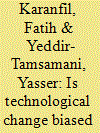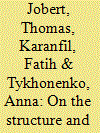| Srl | Item |
| 1 |
ID:
105780


|
|
|
|
|
| Publication |
2011.
|
| Summary/Abstract |
In this paper, the relationship between per capita CO2 emissions and the share of industrial value added in gross domestic product (GDP) for the G-7 countries is discussed using a novel approach. It is assumed that per capita CO2 emissions are correspondent to the share of industrial value added in GDP. A model is developed using hidden Markov process to search this initial assumption. In the model, the data for industrial share in GDP are assigned to be the observations, while the data for per capita CO2 emissions represent the hidden process, which may be then predicted using the ratio of industrial value added to GDP. The data set covers the period from 1970 to 2008 and the model is tested for the G-7 countries. The study findings show that, except in the case of Canada, the hidden Markov model performs reasonably well in tracking per capita CO2 emissions. The study results provide also a basis for a number of policy implications.
|
|
|
|
|
|
|
|
|
|
|
|
|
|
|
|
| 2 |
ID:
094868


|
|
|
|
|
| Publication |
2010.
|
| Summary/Abstract |
Since the adoption and implementation of new technologies has an important influence on the structure and performance of the economy in both developed and developing countries, many research papers are devoted to the technology-economy nexus. Motivated by the fact that the impact of technical progress on the demand for different production factors may vary depending on the bias of the technological change, in this paper, by estimating a translog cost-share system and using state-space modeling technique, we investigate to what extent the direction of technical change is biased toward energy and away from other factors. By applying this methodology to the French economy for the period 1978-2006 the obtained results suggest that: first, technical change has a non-neutral impact on factor demands; second, capital-saving technical progress is present in the majority of the sectors studied; third, energy demand has increased in all sectors but electricity and gas. These findings may have important policy implications for environmental and energy issues in France.
|
|
|
|
|
|
|
|
|
|
|
|
|
|
|
|
| 3 |
ID:
125870


|
|
|
|
|
| Publication |
2013.
|
| Summary/Abstract |
Much of the existing literature on the relationship between nuclear energy consumption and gross domestic product (GDP) deals only with the causal links between these two variables. However, very little attention has been paid to the structure and form of this relationship. This paper first uses panel cointegration techniques to illustrate the form of an inverted U-shaped curve that arises from pooled data, then, applies the iterative empirical Bayesian procedure in order to account for the heterogeneity in the coefficients of the long-term relationship. The empirical results from a multivariate framework involving carbon dioxide (CO2) emissions reveal that for only 3 of the 21 nuclear countries studied, a linear form of the relationship can be justified and that nuclear energy goes from being a normal good to being an inferior good for the majority of the sample countries.
|
|
|
|
|
|
|
|
|
|
|
|
|
|
|
|